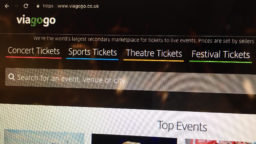An Italian court has rejected an appeal from Switzerland-based secondary ticket seller viagogo against a €3.7 million (approximately $4.5m) fine for hosting tickets sold in contravention of Italian law.
The judgment, which was handed down by the Regional Administrative Court of Lazio earlier this month, upholds a 2020 ruling brought by Italian Communications Regulatory Authority AGCOM sanctioning viagogo for listing tickets to 37 events at above face value between March and July 2019.
Today’s news marks the latest blow globally for viagogo, following February’s news that the company is being forced to sell all of StubHub’s business outside North America due to competition concerns identified by the UK’s Competition and Markets Authority (CMA).
viagogo acquired eBay’s ticketing division StubHub for $4.05 billion in cash in February 2020 and an investigation carried out by the CMA has concluded that the proposed merger between the two firms “will lead to a substantial reduction in competition in the secondary ticketing market in the UK”.
Italy’s 2017 Budget law states that tickets for entertainment events must only be sold by authorised ticket providers in Italy.
Consumers are, however, permitted to sell unwanted tickets at face value or less.
Viagogo argued in court that it was acting as a “passive hosting provider” by connecting resellers with potential buyers.
If this were decided in court to be true, it would exempt the resale platform from liability under Italian law implementing the E-Commerce Directive. Viagogo’s argument was rejected.
The court found that viagogo provides a range of services and promotes and advertises tickets in such a way that it could not be considered to be playing a passive role in the buying and selling of tickets on its platform.
“The service provided by the viagogo…clearly does not have the characteristics of passive hosting.”
Court statement
The Court stated: “The service provided by the viagogo…clearly does not have the characteristics of passive hosting, given that it clearly does not consist in the mere ‘storage of information’, but rather in the articulated activities of optimisation and advertising promotion of the titles on sale….
“Nor has the appellant in any way substantiated the claim that such complex activities would be carried out by the platform in a completely automatic manner and without any awareness and/or possibility of control on its part”.
“Uncapped secondary marketplaces such as viagogo have long been shielding under the liability exemption offered by EU law by claiming to have little to no knowledge of the activity taking place on their sites.”
Sam Shemtob, FEAT Director
FEAT Director Sam Shemtob, said: “Uncapped secondary marketplaces such as viagogo have long been shielding under the liability exemption offered by EU law by claiming to have little to no knowledge of the activity taking place on their sites.
“It is time that they’re held responsible for the illegal activity they promote and profit from, both in Italy and across Europe”.
Elsewhere, the UK’s Competition and Markets Authority launched a Phase 1 inquiry into viagogo’s proposed $4.05 billion cash acquisition of eBay’s ticketing division StubHub in December 2019.
In June 2020, after completing an initial Phase 1 investigation into the merger, the CMA raised concerns about the loss of competition in the country’s secondary ticketing sector that could be brought about as a result of the merger.Music Business Worldwide




